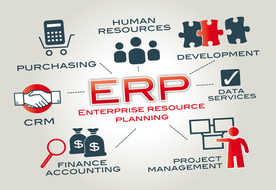 Every organization, be it a large organization or a SME, requires an agile and affordable business management system which provides benefits of real-time capabilities for their business. Enterprise Resource Planning (ERP) solution contributes as a major game changer for most businesses. However, an ERP system must be implemented after much deliberation on the requirement matrix and meticulous planning.
Every organization, be it a large organization or a SME, requires an agile and affordable business management system which provides benefits of real-time capabilities for their business. Enterprise Resource Planning (ERP) solution contributes as a major game changer for most businesses. However, an ERP system must be implemented after much deliberation on the requirement matrix and meticulous planning.
ERP implementation is not entirely a technical job. A lot of planning and analysis is required keeping in mind different functional nodes. While implementing ERP at GVK, we chose ERP system/hardware/implementation partners from the Tier I space who are global leaders, as we did not want to compromise on the functionality or quality. Our strategy was to go live on all modules concurrently i.e. Finance, Supply Chain Management, Plant Maintenance and other functions. This was done to ensure that we develop processes that are well integrated and provide the anticipated benefits quickly. We also chose to go live first with companies that are in operational mode and can get maximum benefits from an integrated system.
Implementing an ERP is a complicated task. It not only takes a considerably long time but also involves a large amount of fortune. So, it is not surprising that a large number of ERP implementations fail putting dents in the pockets of those looking to implement a business transformation solution. Listed below are some of the top challenges faced at GVK while implementing the ERP.
Organizational Challenges: